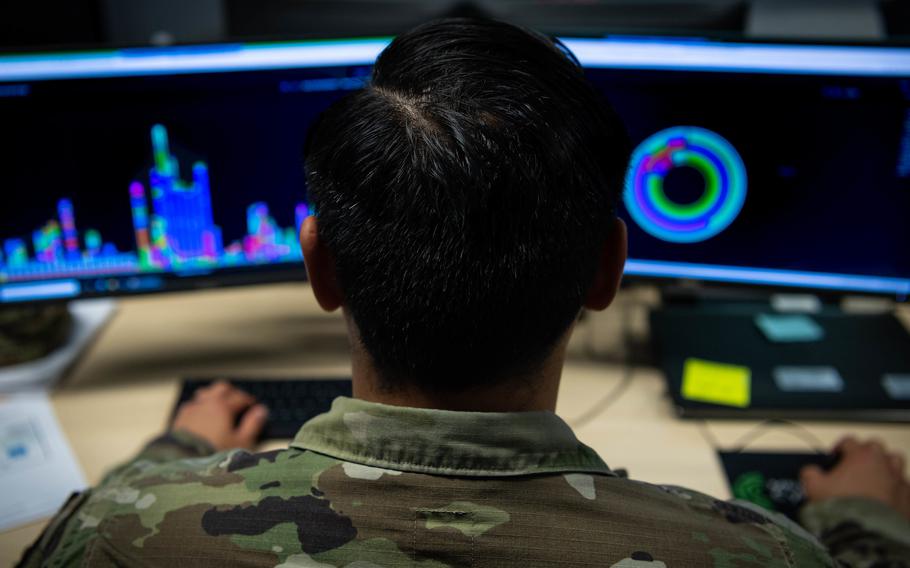
A U.S. airman analyzes a network during a cyber exercise at Ramstein Air Base, Germany, in 2022. Cybercrime is among the tactics being used by Russia and China in a stepped-up campaign of hybrid warfare against Western allies, NATO Secretary-General Mark Rutte said Dec. 4, 2024, during a meeting of the bloc's foreign ministers. (Jared Lovett/U.S. Air Force)
Countries in the U.S.-led NATO alliance must find new ways of countering the stepped-up efforts by Russia and China to destabilize Europe with sabotage campaigns, the bloc’s top official said Wednesday.
Cybercrime, attacks on infrastructure and the weaponization of energy are among their tactics, NATO Secretary-General Mark Rutte said during a meeting of allied foreign ministers.
“We have to discuss how we will defend ourselves,” Rutte said. “And that means that you will look at ways to have better intelligence sharing, but also making sure that we can protect our critical infrastructure.”
Foreign ministers agreed Wednesday to a set of “proactive measures,” including more exercises, Rutte said. Allies also will get tough on Russia’s shadow fleet of oil-exporting ships, said Rutte, who did not offer specifics on the various plans in the works.
Rutte, who hosted the two-day meeting at NATO headquarters in Brussels, emphasized that increased cooperation between China and Russia poses challenges on a variety of fronts.
The military and financial support Russia has received from Beijing for Moscow’s war effort point to the increasingly global nature of the battle in Ukraine, Rutte said.
Iran and North Korea’s separate contributions to Russia’s military campaign also raises broader security risks for the West, he said.
Meanwhile, U.S. and European military officials for months have been alarmed by increasingly brazen acts of sabotage that are believed to have been carried out by Russian agents. China also has been suspected of recent mischief.
“Both Russia and China have tried to destabilize our countries and divide our societies with acts of sabotage, cyberattacks and energy blackmail,” he said.
Two weeks ago, Swedish officials launched an investigation into a Chinese cargo ship that was navigating in the vicinity of two Baltic Sea communications cables connecting Germany and Finland and Lithuania and Sweden, respectively, that were severed.
The vessel is suspected of having dragged its anchor over the cables, severing them. In the U.S., corporations were urged to strengthen communication networks following news of a sprawling hacking campaign that authorities say gave China access to private phone conversations of an unknown number of Americans.
Allies also have complained about acts of arson, an assassination attempt on an industrial leader in Germany and instances of sabotage at various logistics centers.
In June, U.S. military bases in Europe were put on heightened alert in connection with potential threats to installations across the Continent.
While the Pentagon never specified the nature of the threat, CNN reported in July that the move came in response to information that Russia-backed actors were considering sabotage attacks against American military personnel and facilities.
Gen. Darryl Williams, the U.S. Army’s top commander in Europe, said during an October meeting in Washington that the risks of broader military escalation are growing.